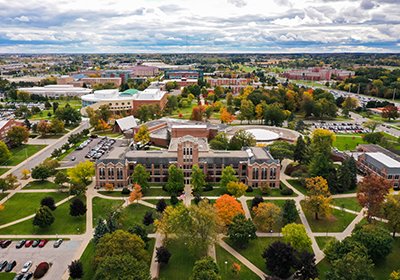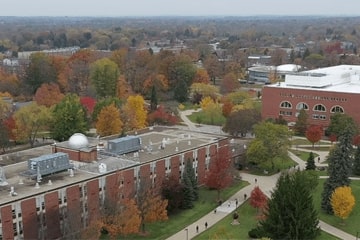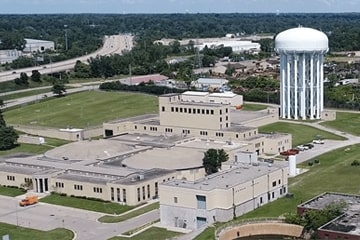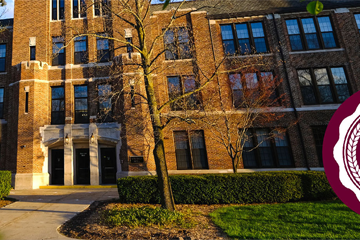CMU sources on COVID-19
Faculty experts can speak to media on a wide range of pandemic-related topics
Everyone has questions about coronavirus and COVID-19. Central Michigan University has answers.
CMU stands ready and willing to provide valuable information to the public in this ongoing and developing crisis. Faculty members with expertise in a wide range of topics are available to discuss many aspects of the pandemic, from medical matters to personal finances.
Here's a guide for news media seeking authoritative sources. Faculty wishing to join the list may email mills1ac@cmich.edu.
Members of the media wishing to schedule interviews are asked to contact Aaron Mills in University Communications at 989-774-1197 or email mills1ac@cmich.edu.
Health and medicine
How COVID-19 works
What makes this virus so deadly? How does it spread so rapidly? What does it to do to the human body?
Biology faculty member Elizabeth Wheeler Alm can answer questions about how the virus invades cells, how coronaviruses mutate, why coronaviruses (and influenza viruses) are more likely to develop strains with pandemic potential, the transmission of disease between humans and animals, and R0 value and contagiousness.
Biography: Alm teaches courses on microbiology, medical microbiology and emerging infectious diseases. Her lab applies microbiological and molecular techniques to the ecology of pathogenic microorganisms in the environment. She has her doctorate from the University of Illinois at Urbana-Champaign, where she also did her postdoc.
How does the coronavirus invade our cells? Why do some people get sick and others don't? How does the virus spread across the globe?
Biology faculty member Mallary Wacker understands the scientific basis of current "experimental" treatment options (such as chloroquine and ventilation) and vaccine candidates, antiviral immunity and the "cytokine storm" that is associated with severe cases.
Biography: Wacker teaches on topics of immunology, inflammation and host-pathogen interactions. Her research is aimed at understanding how the bacterium Staphylococcus aureus perturbs the ability of human phagocyte cells to effectively kill ingested bacteria and regulate excessive inflammation. She received her doctorate from the University of Notre Dame and did her postdoc at the University of Iowa.
How does the virus mess with our immune system? Why it is worse in some than in others?
Chemistry and Biochemistry faculty member Stephen Juris can speak on human-pathogen interactions and the immune response.
Biography: Juris teaches biology, cell biology, biochemistry and immunology. His research focuses on the biochemical and cell biological action of bacterial toxins that target the cytoskeleton. He earned his doctorate from the University of Michigan and did his postdoc at Harvard Medical School.
How does infectious disease work? How can people stay healthy when traveling?
Dr. Nicholas Haddad is an infectious disease specialist with CMU Health. His areas of special interest and medical expertise include complicated lung infections, fevers, communicable diseases, infections in immunocompromised individuals, and travel health (prevention, vaccination and post-travel illnesses).
Biography: Haddad has more than 15 years of experience practicing adult medicine. He received his medical degree from the American University of Beirut in Lebanon and completed an internal medicine residency at the Indiana University School of Medicine. Haddad furthered his training with an infectious disease fellowship at the Washington University School of Medicine in St. Louis, Missouri. Haddad treats patients at CMU Health in Saginaw, as well as Covenant HealthCare and Ascension St. Mary's hospitals.
The virus and public health
How does COVID-19 affect public health?
Jeff Inungu, director of CMU's Master of Public Health degree program, can speak about many aspects of the virus's impact on public health.
Biography: Inungu's research areas include infectious diseases, health disparities and global health. He received his medical degree from the University of Kinshasa, Democratic Republic of the Congo, and his Master of Public Health and Doctor of Health degrees from Tulane University.
How is CMU helping to identify early warning signs of COVID-19 spreading?
Michael Conway is leading a team of faculty engaged in a statewide early warning pilot program to search for signs of COVID-19 in wastewater samples.
Biography: Conway has developed a multidisciplinary approach to study the molecular biology, virology and medical entomology. His lab studies focus on identifying vector proteins and pathways involved in the transmission of arthropod-borne pathogens.
How is CMU researching the effects of COVID-19 on patients with other medical conditions?
Dr. Asim Kichloo is the co-author of numerous studies about the impact of COVID-19 on patients with various medical conditions including lupus, Epstein Barr virus, orthostatic tachycardia syndrome, thrombosis/hemostasis, renal disease and gastrointestinal concerns.
Biography: Kichloo is a doctor of internal medicine at Ascension St. Mary’s Hospital in Saginaw, Michigan. He’s an associate professor and the clerkship director for CMU’s College of Medicine.
Hospitals, drugs and health care professionals
How does COVID-19 affect hospitals and preparedness? How does this pandemic compare to others in history? How are drugs and vaccines developed? What about chloroquine and hydroxychloroquine?
Graduate teaching faculty member Dr. Dan Vick in the Master of Health Administration degree program can speak on the challenges hospitals face during the pandemic and discuss the pandemic in a historical context. He also can talk about vaccine and drug development, testing and approval, and the use of chloroquine and hydroxychloroquine to treat those with the virus.
Biography: After medical school, Vick was commissioned a captain in the U.S. Army and completed a transitional internship at Walter Reed Army Medical Center, followed by a pathology residency in the military's National Capital Consortium residency program. After nine years of Army service, Vick was a partner in a private pathology practice in Syracuse, New York, before he transitioned to hospital administration.
What kinds of pressures do doctors and other health care workers face? How can they cope with the stresses and stay healthy?
Dr. Furhut Janssen can speak to the mental and physical toll of the COVID-19 crisis on emergency room doctors and other health care professionals.
Biography: Janssen is director of the psychiatry residency program at CMU's College of Medicine. She is an expert on the mental pressures endured by doctors and other medical staff. She is helping to start a national physicians help link and also helps run support groups for CMU faculty, staff and students.
How are nurses impacted? What risks do they face?
Bethany Brown, assistant director of nursing in The Herbert H. and Grace A. Dow College of Health Professions, has the experience to talk about the issues facing nurses in today's environment, where nurses are being pushed to their limits in a situation that endangers their lives physically and emotionally.
Biography: Brown is certified in electronic fetal monitoring and is a women's health nurse practitioner, a certified nurse midwife and a doctor of nursing practice.
Socioeconomic factors
How do biology and culture influence health and disease?
Biological anthropology faculty member Cathy Willermet has created a short video outlining what a pandemic is, how we go about trying to understand how it spreads, why morbidity and mortality rates are hard to estimate, and why we need to avoid stigmatizing people.
Biography: Willermet's research focuses on cultural and biological influences on health and disease.
How does COVID-19 affect rural health care?
Dr. Sethu Reddy, professor and chair of medicine in CMU's College of Medicine, can speak to the unique challenges faced by patients in rural areas, such as general precautions and guidelines, and special challenges in rural Michigan, such as food, medication, social support systems and access to services.
Biography: Reddy's research interests are primarily devoted to clinical endocrinology, including obesity and thyroid disorders and the epidemiology of diabetes and its complications. He previously has been chief of adult diabetes at Joslin Diabetes Center, Harvard; chairman of endocrinology, diabetes and metabolism at Cleveland Clinic; and a vice president for medical affairs at Merck.
Dr. Jyotsna Pandey is course director for interprofessional education and hematology-oncology, CMU College of Medicine. Pandey can speak to the unique challenges faced by patients in rural Michigan, such as general precautions and guidelines regarding food, medication, social support systems and access to services.
Biography: Pandey's clinical specialty is anatomic pathology, clinical pathology, hematopathology and cytopathology. She teaches clinico-pathological correlations, pathophysiology and pathology courses to first- and second-year medical students in an interdisciplinary team setting.
Self and family
Staying physically healthy
How important are masks? What are the best ways to make and wear them?
School of Health Sciences faculty member Lana Ivanitskaya can speak to the efficacy of various types of self-made masks and face coverings, including science-based advice on materials and designs.
Biography: Ivanitskaya is an industrial-organizational psychologist who specializes in the study of human behavior in health settings.
Why is nutrition important?
Nutrition faculty member Roschelle Heuberger can speak to how poor nutritional status has altered the profile of who gets COVID-19 in the United States, why nutrition is important to immunological competency and how food safety is important to halting the spread of the virus.
Biography: Heuberger is a registered dietitian who is formally trained as a nutritional epidemiologist. She teaches on the topics of medical nutrition therapy, geriatric nutrition and end-of-life care.
Stress and ways to manage it
How does stress affect families?
Sheltering in place in times of stress can push families too far. Human development faculty member Cheryl Geisthardt can talk about the adverse effects of stress on families.
Biography: Geisthardt's teaching and research focus on understanding and promoting optimal development, health and well-being for children and families. She works with and studies children and families experiencing acute or chronic stress particularly related to child abuse or neglect, poverty, racism, health problems, or disability.
How can music make a difference?
Musicology faculty member Keith Clifton can speak about how different forms of music can help people cope with stress.
Biography: Clifton specializes in classical concert music but also has a strong background in popular music and has taught courses on the history of rock. He has master's and doctoral degrees in music from Northwestern University. He is immediate past-president of the Great Lakes chapter of the College Music Society and a member of the American Musicological Society.
What are some of the ways people respond to traumatic situations? What kinds of support are needed?
Counseling and special education faculty member Sheri Pickover can speak about crisis management and trauma. She is available for written media interviews only.
Biography: Pickover is a licensed professional counselor with 30 years of clinical experience and has been a counselor educator for 17 years. Her clinical and research expertise have focused on human development, attachment theory, crisis management and trauma.
Children and learning
What should I tell my children about COVID-19?
Psychology faculty members Sarah Domoff and Larissa Niec can speak about how parents can talk to their children about the coronavirus.
Biography: Domoff and Niec are clinical psychologists who work with the CMU Center for Children, Families and Communities. They help parents develop stronger relationships with their children through Parent-Child Interaction Therapy.
How does remote learning work with young children?
Human Development and Family Studies faculty member Holly Hoffman can speak to issues of remote learning and engagement and connections between home and school in early childhood.
Biography: Hoffman's background includes working with young children in inclusive settings, collaborating with families and supporting pre-service teachers. Her research focuses on the development of humor in children, workplace climates, inclusive practices, leadership and families facing medical issues with their children.
How do K-12 teachers and their students manage remote learning? What kind of help is available?
English and education faculty member Troy Hicks can speak to support for K-12 teachers and online learning.
Biography: Hicks directs the Chippewa River Writing Project and the Master of Arts in learning, design and technology degree program. A former middle school teacher, Hicks is an ISTE-certified educator and has authored numerous books, articles, chapters, blog posts and other resources related to teaching literacy in our digital age.
How can parents and teachers help children with remote learning?
Educational Leadership faculty member Gina Espinoza-Wilson can speak to resources and tips for parents and teachers in this time of remote learning.
Biography: Espinoza-Wilson is program director for the Master of Arts in educational leadership degree and a fixed-term faculty member in Educational Leadership. She and her colleagues have created a departmental Google Drive to help parents and teachers during this time. She worked in pre-K-12 public education for 20 years as a teacher, central office administrator and building-level principal.
Business and finances
Business and personal finances
How is COVID-19 affecting businesses and bank accounts?
Spencer Robinson, faculty member in the Department of Entrepreneurship and the Department of Finance and Law and director of CMU's real estate development and finance program, can discuss what happens when people and businesses fall behind on their payments. He can answer questions such as: How does this affect investors, developers and capital markets? How do abatements on mortgages and rents for houses and apartments impact housing?
Biography: Robinson consults, researches, speaks and serves as an expert on real estate topics around appraisal, capital markets, entrepreneurship, housing, investment, sustainability, valuation and more.
Businesses and employees
What can organizations learn to better prepare for the future? How will working at home affect employees' well-being? How can efficiency improve while staff work at home? What happens when federal money stops flowing?
Psychology faculty member Stephen Colarelli can speak about workplace issues related to the pandemic, including employer-employee dynamics and how employers can continue to support employees economically in ways that seem fair.
Biography: Colarelli is a psychologist who focuses on human and organizational behavior, as well as human resource technologies.
Impact on the hospitality industry
How is the hospitality industry affected?
Hospitality faculty member Nizar "Nick" Hussein can discuss how COVID-19 has shaken the hospitality industry and what businesses are doing to plan for the future.
Biography: Hussein is internship director of CMU's hospitality program, faculty advisor to the Hospitality Tourism Society, and a member of the Michigan Lodging and Tourism Association.
Faculty research
Health and medicine
Central Michigan University faculty are researching a range of subjects related to the coronavirus pandemic. Below is a selection of recent research.
Studying COVID-19’s impact on mental health using Google Trends
James I. Gerhart (co-author) in clinical psychology used Google Trends to identify and track mental health-related Google searches in the United States. Gerhart and colleagues identified pandemic-associated increases in searches related to anxiety and anxiety treatment.
Working with limited personal protective equipment during the COVID-19 crisis
Kechi Iheduru-Anderson (author) in nursing examined the “emotional roller coaster” acute care nurses experienced during the early weeks of the pandemic while lacking adequate personal protective equipment.
Identifying coronavirus in carp cDNA from Wuhan, China
Michael Conway (author) in microbiology explored whether severe acute respiratory syndrome (SARS)-like coronavirus is a common environmental pathogen in aquatic habitats in the Wuhan, China region.
Managing diabetes in developing countries that have a high rate of COVID-19
Shayesteh Jahanfar (co-author) in public health and colleagues researched challenges in diabetes management during the COVID-19 outbreak in developing countries. Diabetes is one of the most critical risks for complications and death in COVID-19 patients.
Psychiatric hospitalization during the pandemic
Dr. Alaa Shanbour, Dr. Zaira Khalid and Michael Fana (co-authors) in the College of Medicine present a series of paranoid delusions about COVID-19 that resulted in patients’ first inpatient psychiatric hospitalizations.
Dr. Asim Kichloo (co-author) in medicine and colleagues reviewed the use of telemedicine during the pandemic to determine the benefits of continuing its usage in the future.




